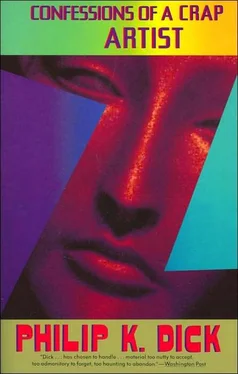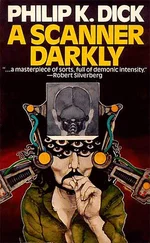“Homer! Get Homestead bread instead!”
I used to hate that commercial, and I had just jumped up to turn to another frequency when all at once the woman’s voice was cut off. Naturally I noticed that; I didn’t have to think twice to be aware that something was up. Here I had my German colonies stamps—those that show the Kaiser’s yacht the Hohenzollern—spread out only a little way from the sunlight, and I had to get them mounted before anything happened to them. But I stood in the middle of my room doing absolutely nothing except respiring, and, of course, keeping other normal processes going. Maintaining my physical side while my mind was focussed on the radio.
My sister and mother and father, naturally, had gone away for the afternoon, so there was nobody to tell. That made me livid with rage. After the news about the Jap planes dropping bombs on us, I ran around and around, trying to think who to call up. Finally I ran downstairs to the living room and phoned Hermann Hauck, who I went around with at Seville High and who sat next to me in Physics 2A. I told him the news, and he came right over on his bicycle. We sat around listening for further word, discussing the situation.
While discussing, we lit up a couple of Camels.
“This means Germany and Italy’ll get right in,” I told Hauck. “This means war with the Axis, not just the Japs. Of course, we’ll have to lick the Japs first, then turn our attention to Europe.”
“I’m sure glad to see our chance to clobber those Japs,” Hauck said. We both agreed with that. “I’m itching to get in,” he said. We both paced around my room, smoking and keeping our ears on the radio. “Those crummy little yellow-bellies,” Hermann said. “You know, they have no culture of their own. Their whole civilization, they stole it from the Chinese. You know, they’re actually descended more from apes; they’re not actually human beings. It’s not like fighting real humans.”
“That’s true,” I said.
Of course, this was back in 1941, and an unscientific statement like that didn’t get questioned. Today we know that the Chinese don’t have any culture either. They went over to the Reds like the mass of ants that they are. It’s a natural life for them. Anyhow it doesn’t really matter, because we were bound to have trouble with them sooner or later anyhow. We’ll have to lick them someday like we licked the Japs. And when the time comes we’ll do it.
It wasn’t long after December 7 that the military authorities put up the notices on the telephone poles, telling Japs that they had to be out of California by such and such a date. In Seville—which is about forty miles south of San Francisco—we had a number of Japs doing business; one ran a flower nursery, another had a grocery store—the usual small-time businesses that they run, cutting pennies here and there, getting their ten kids to do all the work, and generally living on a bowl of rice a day. No white person can compete with them because they’re willing to work for nothing. Anyhow, now they had to get out whether they liked it or not. In my estimation it was for their own good anyhow, because a lot of us were stirred up about Japs sabotaging and spying. At Seville High a bunch of us chased a Jap kid and kicked him around a little, to show how we felt. His father was a dentist, as I recall.
The only Jap that I knew at all was a Jap who lived across the street from us, an insurance salesman. Like all of them, he had a big garden out on the sides and rear of his house, and in the evenings and on weekends he used to appear wearing khaki pants, a t-shirt, and tennis shoes, with an armload of garden hose and a sack of fertilizer, a rake and a shovel. He had a lot of Jap vegetables that I never recognized, some beans and squash and melons, plus the usual beets and carrots and pumpkins. I used to watch him scratching out the weeds around the pumpkins, and I’d always say:
“There’s Jack Pumpkinhead out in his garden, again. Searching for a new head.”
He did look like Jack Pumpkinhead, with his skinny neck and his round head; his hair was shaved, like the college students have theirs, now,’and he always grinned. He had huge teeth, and his lips never covered them.
The idea of this Jap wandering around with a rotting head, in search of a fresh head, used to dominate me, back at that time before the Japs were moved out of California. He had such an unhealthy appearance—mostly because he was so thin and tall and stooped—that I conjectured as to what ailed him. It looked to me to be t.b. For a while I had the fear—it bothered me for weeks—that one day he’d be out in the garden, or walking down his path to get into his car, and his neck would snap and his head would bounce off his shoulders and roll down to his feet. I waited in fear for this to happen, but I always had to look out when I heard him. And whenever he was around I could hear him, because he continually hawked and spat. His wife spat, too, and she was very small and pretty. She looked almost like a movie star. But her English, according to my mother, was so bad that there was no use of anybody trying to talk to her; all she did was giggle.
The notion that Mr. Watanaba looked like Jack Pumpkinhead could never have occurred to me if I hadn’t read the Oz books in my younger years; in fact I still had a few of them around my room as late as World War Two. I kept them with my science-fiction magazines, my old microscope and rock collection, and the model of the solar system that I had built in junior high school for science class. When the Oz books were first written, back around 1900, everybody took them to be completely fiction, as they did with Jules Verne’s books and H.G. Wells’. But now we’re beginning to see that although the particular characters, such as Ozma and the Wizard and Dorothy, were all creations of Baum’s mind, the notion of a civilization inside the world is not such a fantastic one. Recently, Richard Shaver has given a detailed description of a civilization inside the world, and other explorers are alerted for similar finds. It may be, too, that the lost continents of Mu and Atlantis will be found to be part of the ancient culture of which the interior lands played a major role.
Today, in the 1950s, everyone’s attention is turned upward, to the sky. Life on other worlds preoccupies people’s attention. And yet, any moment, the ground may open up beneath our feet, and strange and mysterious races may pour out into our very midst. It’s worth thinking about, and out in California, with the earthquakes, the situation is particularly pressing. Every time there’s a quake I ask myself: is this going to open up the crack in the ground that finally reveals the world inside? Will this be the one?
Sometimes at the lunch hour break, I ye discussed this with the guys I work with, even with Mr. Poity, who owns the firm. My experience has been that if any of them are conscious of non-terrestrial races at all, they’re concerned only with UFO’s, and the races we’re encountering, without realizing it, in the sky. That’s what I would call intolerance, even prejudice, but it takes a long time, even in this day and age, for scientific facts to become generally known. The mass of scientists themselves are slow to change, so it’s up to us, the scientifically-trained public, to be the advance guard. And yet I’ve found, even among us, there are so many that just don’t give a damn. My sister, for instance. During the last few years she and her husband have been living up in the north western part of Marin County, and all they seem to care about up there is Zen Buddhism. And so here’s an example, right in my own family, of a person who has turned from scientific curiosity to an Asiatic religion that threatens to submerge the questioning rational faculty as surely as Christianity.
Читать дальше










